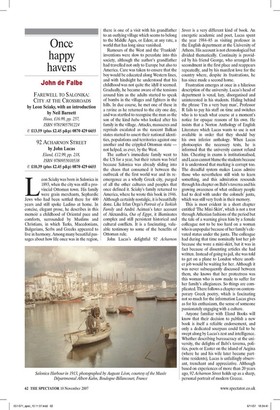Once happy havens
John de Falbe FAREWELL TO SALONIKA: CITY AT THE CROSSROADS by Leon Sciaky, with an introduction by Neil Barnett Haus, f16.99, pp. 257, ISBN 9781905791224 £13.59 (plus £2.45 p&p) 0870 429 6655 92 ACHARNON STREET by John Lucas Eland, fl 2.99, pp. 218, ISBN 9780955010538 £1039 (plus £2.45 p&p) 0870 429 6655 Leon Sciaky was born in Salonica in 1893, when the city was still a provincial Ottoman town. His family were grain merchants, Sephardic Jews who had been settled there for 400 years and still spoke Ladino at home. In concise, elegant prose, he describes in this memoir a childhood of Oriental pace and comforts, surrounded by Muslims and Christians, in which Turks, Macedonians, Bulgarians, Serbs and Greeks appeared to live in harmony. Among many beautiful passages about how life once was in the region, there is one of a visit with his grandfather to an outlying village which seems to belong to the Middle Ages, or Eden; at any rate, a world that has long since vanished.
Rumours of the West and the 'Frankish' inventions were slow to percolate into this society, although the author's grandfather had travelled not only to Europe but also to America. Care was taken to ensure that the boy would be educated along Western lines, and with hindsight he understood that his childhood was not quite the idyll it seemed. Gradually, he became aware of the tensions around him as the adults started to speak of bombs in the villages and fighters in the hills. In due course, he met one of these in a ravine as he returned to the city one day, and was startled to recognise the man as the son of the kind babu who looked after his family in the village. Attacks, massacres and reprisals escalated as the nascent Balkan states started to assert their national identities, populations and territories against one another and the crippled Ottoman state — not helped, as ever, by the West.
The author's immediate family went to the US for a year, but their return was brief because Salonica was already sliding into the chaos that consumed it between the outbreak of the first world war and its reemergence as a wholly Greek city, purged of all the other cultures and peoples that once defined it. Sciaky's family returned to America, where he wrote this book in 1946. Although certainly nostalgic, it is beautifully done. Like Irfan Orga's Portrait of a Turkish Family and Andre Aciman's later account of Alexandria, Out of Egypt, it illuminates complex and still persistent historical and cultural conflicts. It is a fascinating, valuable testimony to some of the benefits of Ottoman rule.
John Lucas's delightful 92 Achamon Street is a very different kind of book. An energetic academic and poet, Lucas spent the year 1984-85 as visiting professor in the English department at the University of Athens. His account is not chronological but divided thematically. Continuity is provided by his friend George, who arranged his secondment in the first place and reappears repeatedly, and by his manifest love for the country where, despite its frustrations, he has since made a second home.
Frustration emerges at once in a hilarious description of the university. Lucas's head of department is venal, lazy, disorganised and uninterested in his students. Hiding behind the phrase `I'm a very busy man', Professor R fails to pay his staff on time and switches who is to teach what course at a moment's notice for opaque reasons of his own. He insists that a Norton Anthology of English Literature which Lucas wants to use is not available in order that they should buy his own inferior anthology. When Lucas photocopies the necessary texts, he is informed that the university cannot refund him Cheating in exams is institutionalised, and Lucas cannot blame the students because it is understood that marking is corrupt too. The dreadful system makes Lucas admire those who nevertheless still wish to learn something, and this admiration resounds through his chapter on Babi's taverna and his growing awareness of what ordinary people had to deal with under the colonels' junta, which was still very fresh in their memory.
This is most evident in a short chapter entitled 'The Mini-Skirt', which is not a trot through Athenian fashions of the period but the tale of a warning given him by a female colleague not to be too hard on a woman who is unpopular because of her family's elevated status under the junta. The colleague had during that time nominally lost her job because she wore a mini-skirt, but it was in fact because of dissenting articles she had written. Instead of going to jail, she was told to get on a plane to London where another job would be waiting for her. Although it was never subsequently discussed between them, she knows that her protectress was this woman who is now made to suffer for her family's allegiances. So things are complicated. There follows a chapter on contemporary Greek poetry, which is fascinating not so much for the information Lucas gives as for his enthusiasm, the sense of someone passionately engaging with a culture.
Anyone familiar with Eland Books will know that their decision to publish a new book is itself a reliable endorsement, and only a dedicated sourpuss could fail to be swept along by Lucas's zest and intelligence. Whether describing bureaucracy at the university, the delights of Babi's taverna, politics, poets or Easter on the island of Aegina (where he and his wife later became parttime residents), Lucas is unfailingly observant, trenchant and appreciative. Although based on experiences of more than 20 years ago, 92 Achamon Street holds up as a sharp, personal portrait of modern Greece.





































































 Previous page
Previous page